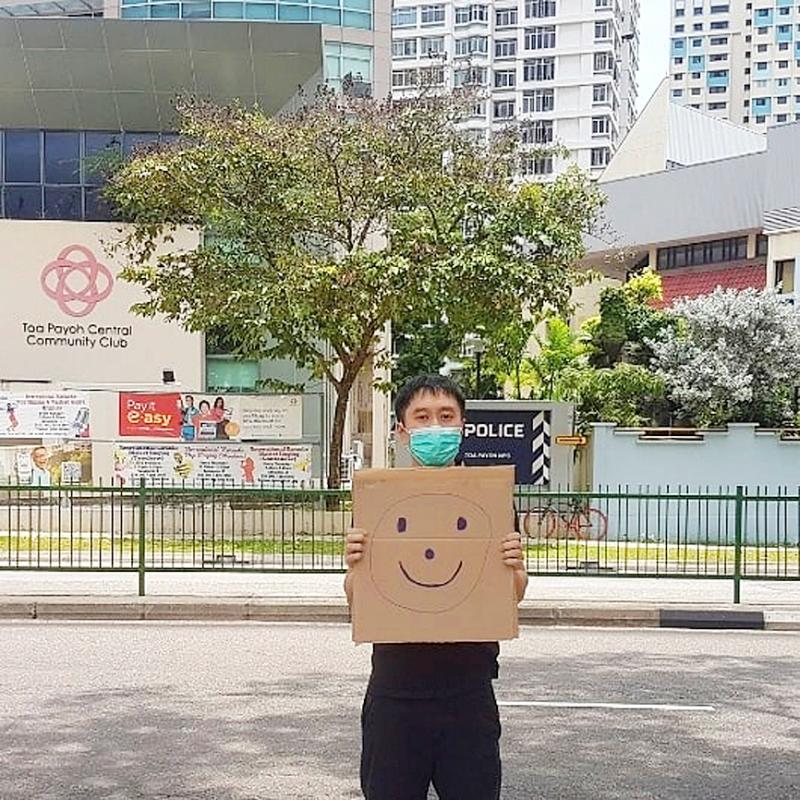Singapore is set to charge a civil rights campaigner with staging a one-man protest without a permit over an incident in which he held up a sign bearing a crudely drawn smiley face outside a police station.
Police on Thursday told Jolovan Wham, 40, that he would be formally charged in court on Monday.
Wham has previously had several run-ins with the authorities in the city-state, which tightly controls public assembly, the media and free speech.

Photo: Jolovan Wham via Reuters
The charge relates to a March incident in which Wham demonstrated his support for a young environmentalist, who said that he had been questioned by police over a similar protest days previous.
Wham posted a picture of himself holding the sign on his social media accounts.
Wham, who has already served two brief stints in jail this year, is to be charged under the Public Order Act, which regulates assemblies and processions in public places, according to a charge sheet Wham posted on Twitter.
He faces a fine of up to S$5,000 (US$3,720).
“These charges against me only show how absurd the situation has become,” Wham wrote in a text message, adding that he planned to plead not guilty.
“Calling what I did an assembly is an abuse of the English language. How can one man standing in public for a few seconds for a photo op be a threat to public order?” he wrote.
Amnesty International Southeast Asia researcher Rachel Chhoa-Howard said that the incident was “yet another example of targeted action” to clamp down on Wham’s “peaceful activism.”

Chinese President Xi Jinping (習近平) is to visit Russia next month for a summit of the BRICS bloc of developing economies, Chinese Minister of Foreign Affairs Wang Yi (王毅) said on Thursday, a move that comes as Moscow and Beijing seek to counter the West’s global influence. Xi’s visit to Russia would be his second since the Kremlin sent troops into Ukraine in February 2022. China claims to take a neutral position in the conflict, but it has backed the Kremlin’s contentions that Russia’s action was provoked by the West, and it continues to supply key components needed by Moscow for

Japan scrambled fighter jets after Russian aircraft flew around the archipelago for the first time in five years, Tokyo said yesterday. From Thursday morning to afternoon, the Russian Tu-142 aircraft flew from the sea between Japan and South Korea toward the southern Okinawa region, the Japanese Ministry of Defense said in a statement. They then traveled north over the Pacific Ocean and finished their journey off the northern island of Hokkaido, it added. The planes did not enter Japanese airspace, but flew over an area subject to a territorial dispute between Japan and Russia, a ministry official said. “In response, we mobilized Air Self-Defense

CRITICISM: ‘One has to choose the lesser of two evils,’ Pope Francis said, as he criticized Trump’s anti-immigrant policies and Harris’ pro-choice position Pope Francis on Friday accused both former US president Donald Trump and US Vice President Kamala Harris of being “against life” as he returned to Rome from a 12-day tour of the Asia-Pacific region. The 87-year-old pontiff’s comments on the US presidential hopefuls came as he defied health concerns to connect with believers from the jungle of Papua New Guinea to the skyscrapers of Singapore. It was Francis’ longest trip in duration and distance since becoming head of the world’s nearly 1.4 billion Roman Catholics more than 11 years ago. Despite the marathon visit, he held a long and spirited

The pitch is a classic: A young celebrity with no climbing experience spends a year in hard training and scales Mount Everest, succeeding against some — if not all — odds. French YouTuber Ines Benazzouz, known as Inoxtag, brought the story to life with a two-hour-plus documentary about his year preparing for the ultimate challenge. The film, titled Kaizen, proved a smash hit on its release last weekend. Young fans queued around the block to get into a preview screening in Paris, with Inoxtag’s management on Monday saying the film had smashed the box office record for a special cinema